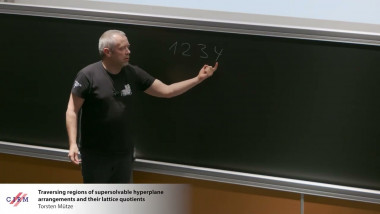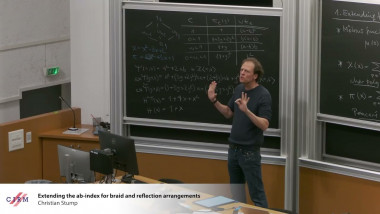
Traversing regions of supersolvable hyperplane arrangements and their lattice quotients
By Torsten Mütze

Extending the ab-index for braid and reflection arrangements
By Christian Stump
Appears in collection : Combinatorics and Arithmetic for Physics - 2024
A partition of a positive integer n is a non-increasing sequence of positive integers, called parts, whose sum is n. A partition identity is a theorem stating that for all n, the number of partitions of n satisfying some conditions (often congruence conditions on the parts) equals the number of partitions of n satisfying some other conditions (often difference conditions between the parts). The Andrews-Gordon identities, which generalise the Rogers-Ramanujan identities, are among the most famous and widely studied partition identities. Using techniques from commutative algebra, Pooneh Afsharijoo conjectured in 2020 a companion to these identities (i.e. a partition identity with the same congruence conditions but other difference conditions). We will explain the origins of this conjecture, give a combinatorial proof using new combinatorial dissections of Young diagrams and q-series identities, and show how another type of combinatorial proof can lead to other (new and known) identities of the same type. This is joint work with Pooneh Afsharijoo, Frédéric Jouhet, Isaac Konan and Hussein Mourtada and on https://doi.org/10.1016/j.aim.2023.1089946 and https://arxiv.org/abs/2403.05414
